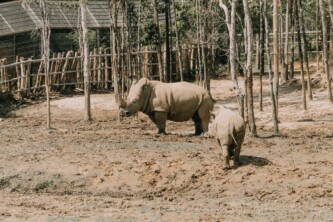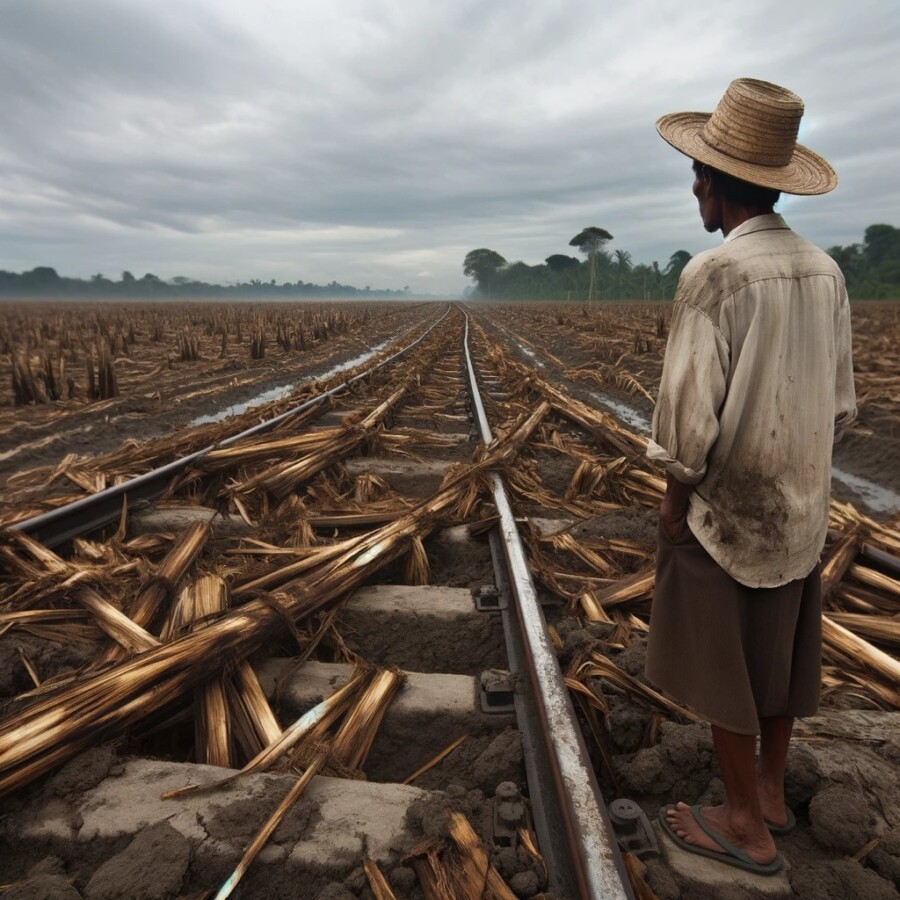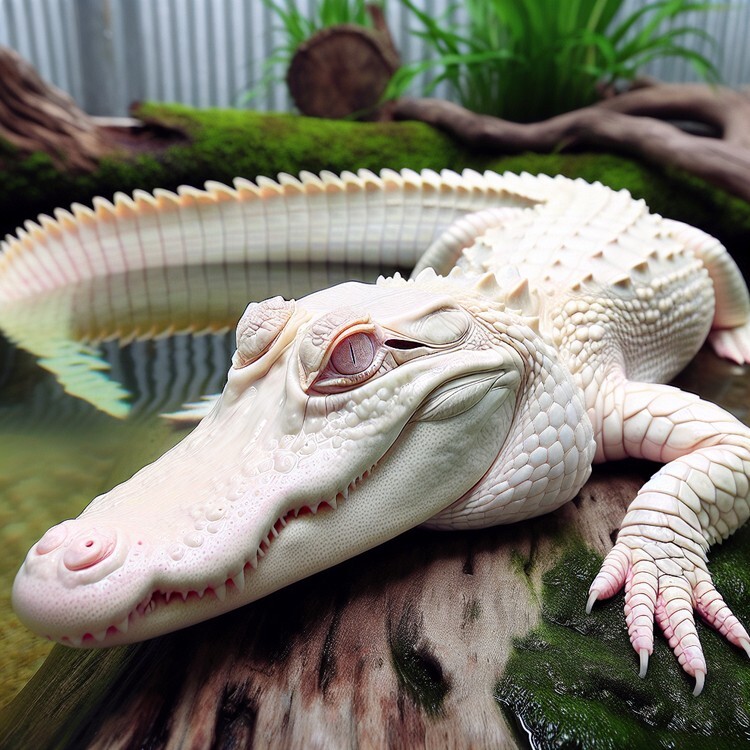A rare Sumatran rhino has been born at a sanctuary in Indonesia. This small calf, weighing 25kg (55lb), is a cause for celebration as there are only around 40 of these animals left in the world. Sumatran rhinos are the smallest of all rhinos and are classified as critically endangered. They can only be found on the Indonesian islands of Sumatra and Borneo, although they used to be found in other countries as well.
The birth of this rhino calf is significant because it represents a small step towards preserving the species. Conservation efforts are crucial in protecting these animals from extinction. The global conservation charity WWF has been working to raise awareness and support for the conservation of Sumatran rhinos.
The Sumatran rhino is facing numerous threats, including habitat loss and poaching. Their population has declined drastically over the years, making successful births like this one extremely rare. The sanctuary in Indonesia provides a safe environment for these rhinos, where they can breed and hopefully increase their numbers.
It is important for us to recognize the value of every individual animal born, as they contribute to the survival of the species as a whole. This rare Sumatran rhino calf is a symbol of hope and a reminder of the importance of conservation efforts. By protecting and preserving their natural habitat, we can ensure the survival of these magnificent creatures for future generations to appreciate and admire.
Original news source: Rare Sumatran rhino born in Indonesia (BBC)
Listen
Slow
Normal
Fast
Group or Classroom Activities
Warm-up Activities:
– News Summary
Instructions:
1. Divide the class into small groups.
2. Provide each group with a copy of the article.
3. Instruct the groups to read the article and summarize the main points.
4. After a designated amount of time, have each group share their summary with the class.
5. Encourage discussion and clarification of any points that may have been missed or misunderstood.
– Opinion Poll
Instructions:
1. As a class, discuss the conservation efforts mentioned in the article.
2. Divide the class into pairs or small groups.
3. Instruct each group to come up with a list of questions related to the article topic.
4. Each group will then conduct an opinion poll within the class, asking their questions and recording responses.
5. After collecting the data, have each group present their findings to the class and facilitate a discussion based on the results.
– Sketch It
Instructions:
1. Provide each student with a blank sheet of paper and a pen/pencil.
2. Instruct the students to read the article carefully.
3. After reading, ask the students to draw a sketch that represents the main idea or key points of the article.
4. Give the students a designated amount of time to complete their sketches.
5. Once finished, have the students share their sketches with the class and explain their choices.
– Vocabulary Pictionary
Instructions:
1. Create a list of key vocabulary words from the article.
2. Divide the class into small groups.
3. Instruct each group to choose a word from the list.
4. Without using any words, one student from each group must draw a picture that represents the chosen word.
5. The other group members must try to guess the word based on the drawing.
6. Rotate roles within the group until all words have been drawn and guessed.
7. Discuss the meanings and definitions of the words as a class.
– Pros and Cons
Instructions:
1. Divide the class into two groups.
2. Assign one group to discuss the pros of conservation efforts for Sumatran rhinos, and the other group to discuss the cons.
3. Give the groups a designated amount of time to brainstorm and gather their thoughts.
4. Once ready, have each group present their arguments to the class, focusing on the positive and negative aspects of conservation efforts.
5. Encourage respectful discussion and debate among the students.
Comprehension Questions:
1. Why is the birth of this Sumatran rhino calf significant?
2. What is the current population of Sumatran rhinos in the world?
3. What are the main threats to the Sumatran rhino population?
4. Why are successful births like this one extremely rare?
5. What is the role of the sanctuary in Indonesia in protecting the Sumatran rhinos?
6. How does the WWF contribute to the conservation of Sumatran rhinos?
7. Why is it important to recognize the value of every individual animal born?
8. What can be done to ensure the survival of Sumatran rhinos for future generations?
Go to answers ⇩
Listen and Fill in the Gaps:
A rare (1)______ rhino has been born at a sanctuary in Indonesia. This (2)______ calf, weighing 25kg (55lb), is a cause for celebration as there are only around 40 of these animals left in the world. Sumatran rhinos are the (3)______ of all rhinos and are classified as critically endangered. They can only be found on the (4)______ islands of Sumatra and Borneo, although they used to be found in other countries as well.
The (5)______ of this rhino calf is (6)______ because it represents a small step towards preserving the (7)______. Conservation efforts are crucial in protecting these animals from extinction. The global conservation (8)______ WWF has been working to raise awareness and support for the conservation of Sumatran rhinos.
The Sumatran (9)______ is facing numerous (10)______, including habitat loss and poaching. Their population has declined drastically over the years, making successful births like this one extremely rare. The sanctuary in Indonesia (11)______ a safe environment for these rhinos, where they can breed and hopefully increase their (12)______.
It is important for us to recognize the value of every individual animal born, as they contribute to the survival of the species as a whole. This rare Sumatran rhino calf is a (13)______ of hope and a reminder of the importance of conservation efforts. By protecting and (14)______ their (15)______ habitat, we can ensure the survival of these magnificent creatures for future generations to appreciate and (16)______.
Go to answers ⇩
Discussion Questions:
Students can ask a partner these questions, or discuss them as a group.
1. What is the significance of the birth of this rare Sumatran rhino calf?
2. How would you feel if you saw a Sumatran rhino in the wild?
3. Do you think enough is being done to protect endangered species like the Sumatran rhino? Why or why not?
4. What do you think are the biggest challenges facing conservation efforts for endangered animals?
5. How would you feel if you knew that a species like the Sumatran rhino could become extinct in your lifetime?
6. Do you think it is the responsibility of humans to protect endangered animals? Why or why not?
7. Have you ever visited a sanctuary or conservation center for endangered animals? If so, what was your experience like?
8. Do you think it is possible to fully restore the population of the Sumatran rhino? Why or why not?
9. How do you think the birth of this rhino calf will impact future conservation efforts?
10. What can individuals do to help protect endangered animals like the Sumatran rhino?
11. Have you ever seen a rhinoceros in person? If so, what was your impression of them?
12. Do you think the government should provide more funding for conservation efforts? Why or why not?
13. How would you feel if you knew that your children or grandchildren may never have the opportunity to see certain animal species in the wild?
14. What is the role of zoos in conservation efforts for endangered animals?
15. Do you think it is more important to focus on conserving endangered animals or preserving their natural habitats? Why or why not?
Individual Activities
Vocabulary Meanings:
Match each word to its meaning.
Words:
1. Sumatran
2. rhino
3. sanctuary
4. Indonesia
5. endangered
6. conservation
7. habitat
8. population
Meanings:
(a) The natural environment where an animal lives
(b) The total number of individuals in a species
(c) The country where the sanctuary is located
(d) A type of rhinoceros found in Sumatra
(e) At risk of extinction
(f) The act of protecting and preserving
(g) A place of protection for animals
(h) A safe place for the Sumatran rhinos to live
Go to answers ⇩
Multiple Choice Questions:
1. How many Sumatran rhinos are left in the world?
(a) Hundreds
(b) Thousands
(c) Millions
(d) Around 40
2. Where can Sumatran rhinos be found?
(a) African savannah
(b) South American rainforests
(c) Indonesian islands of Sumatra and Borneo
(d) European mountains
3. Why is the birth of this rhino calf significant?
(a) It is the first Sumatran rhino born in captivity
(b) It is the largest Sumatran rhino ever born
(c) It is the only Sumatran rhino left in the world
(d) It represents a small step towards preserving the species
4. What is one of the threats facing Sumatran rhinos?
(a) Overpopulation
(b) Habitat loss
(c) Lack of food
(d) Climate change
5. What organization has been working to raise awareness and support for the conservation of Sumatran rhinos?
(a) WWF
(b) Greenpeace
(c) Red Cross
(d) UNICEF
6. Why are successful births like this one extremely rare?
(a) The population of Sumatran rhinos has declined drastically
(b) Sumatran rhinos are naturally infertile
(c) Sumatran rhinos are highly aggressive towards their young
(d) Sumatran rhinos have a short gestation period
7. What does the sanctuary in Indonesia provide for the rhinos?
(a) A place to hunt for food
(b) A place to socialize with other animals
(c) A safe environment to breed
(d) A place to migrate to other countries
8. What is the importance of protecting and preserving the natural habitat of Sumatran rhinos?
(a) It provides a safe environment for poachers
(b) It ensures the survival of the species for future generations
(c) It allows other animals to invade their territory
(d) It increases the chances of successful births
Go to answers ⇩
True or False Questions:
1. Sumatran rhinos are the smallest of all rhinos.
2. A rare Sumatran rhino has been born at a sanctuary in Indonesia.
3. The birth of this rhino calf is insignificant for preserving the species.
4. There are more than 40 Sumatran rhinos left in the world.
5. The global conservation charity WWF has been working against the conservation of Sumatran rhinos.
6. The sanctuary in Indonesia provides a safe environment for these rhinos to breed and increase their numbers.
7. The calf weighs 30kg (66lb).
8. They can only be found on the Indonesian islands of Sumatra and Borneo.
Go to answers ⇩
Write a Summary:
Write a summary of this news article in two sentences.
Check your writing now with the best free AI for English writing!
Writing Questions:
Answer the following questions. Write as much as you can for each answer.
Check your answers with our free English writing assistant!
1. How many Sumatran rhinos are left in the world?
2. Where can Sumatran rhinos be found?
3. What are the main threats to the Sumatran rhino population?
4. Why is the birth of this rhino calf significant?
5. What can be done to protect and preserve the Sumatran rhino population?
Answers
Comprehension Question Answers:
1. The birth of this Sumatran rhino calf is significant because there are only around 40 of these animals left in the world, making successful births extremely rare. It represents a small step towards preserving the species.
2. The current population of Sumatran rhinos in the world is estimated to be around 40.
3. The main threats to the Sumatran rhino population include habitat loss and poaching.
4. Successful births like this one are extremely rare because the population of Sumatran rhinos has declined drastically over the years. There are very few individuals left, making it difficult for them to find suitable mates and reproduce.
5. The sanctuary in Indonesia provides a safe environment for the Sumatran rhinos, where they can breed and hopefully increase their numbers. It offers protection from poaching and habitat loss.
6. The WWF contributes to the conservation of Sumatran rhinos by raising awareness and support for their conservation. They work to protect and preserve their natural habitat and implement measures to prevent poaching.
7. It is important to recognize the value of every individual animal born because they contribute to the survival of the species as a whole. Each birth represents hope and the potential for the population to increase.
8. To ensure the survival of Sumatran rhinos for future generations, it is important to continue conservation efforts. This includes protecting their natural habitat, implementing measures to prevent poaching, and supporting breeding programs in sanctuaries. Collaboration between governments, conservation organizations, and local communities is also crucial in preserving these animals.
Go back to questions ⇧
Listen and Fill in the Gaps Answers:
(1) Sumatran
(2) small
(3) smallest
(4) Indonesian
(5) birth
(6) significant
(7) species
(8) charity
(9) rhino
(10) threats
(11) provides
(12) numbers
(13) symbol
(14) preserving
(15) natural
(16) admire
Go back to questions ⇧
Vocabulary Meanings Answers:
1. Sumatran
Answer: (d) A type of rhinoceros found in Sumatra
2. rhino
Answer: (g) A place of protection for animals
3. sanctuary
Answer: (c) The country where the sanctuary is located
4. Indonesia
Answer: (e) At risk of extinction
5. endangered
Answer: (f) The act of protecting and preserving
6. conservation
Answer: (a) The natural environment where an animal lives
7. habitat
Answer: (b) The total number of individuals in a species
8. population
Answer: (h) A safe place for the Sumatran rhinos to live
Go back to questions ⇧
Multiple Choice Answers:
1. How many Sumatran rhinos are left in the world?
Answer: (d) Around 40
2. Where can Sumatran rhinos be found?
Answer: (c) Indonesian islands of Sumatra and Borneo
3. Why is the birth of this rhino calf significant?
Answer: (d) It represents a small step towards preserving the species
4. What is one of the threats facing Sumatran rhinos?
Answer: (b) Habitat loss
5. What organization has been working to raise awareness and support for the conservation of Sumatran rhinos?
Answer: (a) WWF
6. Why are successful births like this one extremely rare?
Answer: (a) The population of Sumatran rhinos has declined drastically
7. What does the sanctuary in Indonesia provide for the rhinos?
Answer: (c) A safe environment to breed
8. What is the importance of protecting and preserving the natural habitat of Sumatran rhinos?
Answer: (b) It ensures the survival of the species for future generations
Go back to questions ⇧
True or False Answers:
1. Sumatran rhinos are the smallest of all rhinos. (Answer: True)
2. A rare Sumatran rhino has been born at a sanctuary in Indonesia. (Answer: True)
3. The birth of this rhino calf is insignificant for preserving the species. (Answer: False)
4. There are more than 40 Sumatran rhinos left in the world. (Answer: False)
5. The global conservation charity WWF has been working against the conservation of Sumatran rhinos. (Answer: False)
6. The sanctuary in Indonesia provides a safe environment for these rhinos to breed and increase their numbers. (Answer: True)
7. The calf weighs 30kg (66lb). (Answer: False)
8. They can only be found on the Indonesian islands of Sumatra and Borneo. (Answer: True)
Go back to questions ⇧















